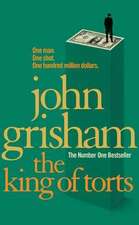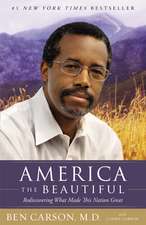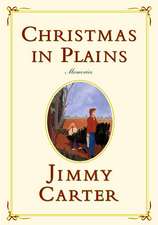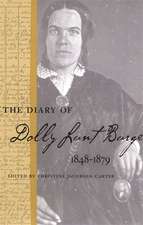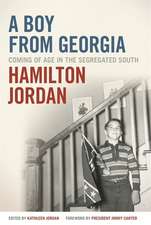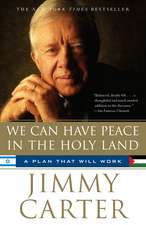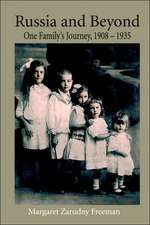A Full Life: Reflections at Ninety: Gates Notes - Cărți recomandate de Bill Gates
Autor Jimmy Carteren Limba Engleză Paperback – 10 aug 2017
At ninety, Jimmy Carter reflects on his public and private life with a frankness that is disarming. He adds detail and emotion about his youth in rural Georgia that he described in his magnificentAn Hour Before Daylight. He writes about racism and the isolation of the Carters. He describes the brutality of the hazing regimen at Annapolis, and how he nearly lost his life twice serving on submarines and his amazing interview with Admiral Rickover. He describes the profound influence his mother had on him, and how he admired his father even though he didn’t emulate him. He admits that he decided to quit the Navy and later enter politics without consulting his wife, Rosalynn, and how appalled he is in retrospect.
In his “warm and detailed memoir” (Los Angeles Times), Carter tells what he is proud of and what he might do differently. He discusses his regret at losing his re-election, but how he and Rosalynn pushed on and made a new life and second and third rewarding careers. He is frank about the presidents who have succeeded him, world leaders, and his passions for the causes he cares most about, particularly the condition of women and the deprived people of the developing world.
“Always warm and human…even inspirational” (Buffalo News),A Full Lifeis a wise and moving look back from this remarkable man. Jimmy Carter has lived one of our great American lives—from rural obscurity to world fame, universal respect, and contentment.A Full Lifeis an extraordinary read from a “force to be reckoned with” (Christian Science Monitor).
Din seria Gates Notes - Cărți recomandate de Bill Gates
- 17%
 Preț: 67.59 lei
Preț: 67.59 lei - 14%
 Preț: 72.63 lei
Preț: 72.63 lei - 16%
 Preț: 64.19 lei
Preț: 64.19 lei - 15%
 Preț: 81.22 lei
Preț: 81.22 lei - 22%
 Preț: 50.01 lei
Preț: 50.01 lei - 21%
 Preț: 56.33 lei
Preț: 56.33 lei - 16%
 Preț: 70.20 lei
Preț: 70.20 lei - 16%
 Preț: 58.13 lei
Preț: 58.13 lei -
 Preț: 69.34 lei
Preț: 69.34 lei - 24%
 Preț: 53.62 lei
Preț: 53.62 lei - 24%
 Preț: 82.56 lei
Preț: 82.56 lei - 25%
 Preț: 61.57 lei
Preț: 61.57 lei - 16%
 Preț: 69.38 lei
Preț: 69.38 lei - 17%
 Preț: 57.65 lei
Preț: 57.65 lei - 15%
 Preț: 70.33 lei
Preț: 70.33 lei - 20%
 Preț: 82.12 lei
Preț: 82.12 lei -
 Preț: 162.17 lei
Preț: 162.17 lei -
 Preț: 82.31 lei
Preț: 82.31 lei -
 Preț: 94.62 lei
Preț: 94.62 lei - 17%
 Preț: 109.29 lei
Preț: 109.29 lei -
 Preț: 121.70 lei
Preț: 121.70 lei -
 Preț: 150.83 lei
Preț: 150.83 lei - 5%
 Preț: 107.54 lei
Preț: 107.54 lei - 23%
 Preț: 84.51 lei
Preț: 84.51 lei -
 Preț: 381.74 lei
Preț: 381.74 lei - 14%
 Preț: 56.04 lei
Preț: 56.04 lei - 16%
 Preț: 69.04 lei
Preț: 69.04 lei - 16%
 Preț: 58.59 lei
Preț: 58.59 lei -
 Preț: 89.22 lei
Preț: 89.22 lei - 14%
 Preț: 72.35 lei
Preț: 72.35 lei -
 Preț: 108.58 lei
Preț: 108.58 lei -
 Preț: 92.12 lei
Preț: 92.12 lei - 16%
 Preț: 58.18 lei
Preț: 58.18 lei - 15%
 Preț: 60.10 lei
Preț: 60.10 lei - 17%
 Preț: 57.52 lei
Preț: 57.52 lei -
 Preț: 150.31 lei
Preț: 150.31 lei -
 Preț: 82.44 lei
Preț: 82.44 lei - 18%
 Preț: 55.89 lei
Preț: 55.89 lei - 24%
 Preț: 62.36 lei
Preț: 62.36 lei - 22%
 Preț: 64.94 lei
Preț: 64.94 lei - 23%
 Preț: 63.84 lei
Preț: 63.84 lei - 14%
 Preț: 72.53 lei
Preț: 72.53 lei -
 Preț: 254.04 lei
Preț: 254.04 lei - 24%
 Preț: 62.77 lei
Preț: 62.77 lei -
 Preț: 73.70 lei
Preț: 73.70 lei - 16%
 Preț: 69.54 lei
Preț: 69.54 lei -
 Preț: 106.56 lei
Preț: 106.56 lei -
 Preț: 94.47 lei
Preț: 94.47 lei -
 Preț: 316.48 lei
Preț: 316.48 lei
Preț: 69.53 lei
Preț vechi: 84.47 lei
-18% Nou
13.31€ • 13.95$ • 11.08£
Carte disponibilă
Livrare economică 14-26 martie
Specificații
ISBN-10: 1501115642
Pagini: 272
Ilustrații: 21 4-C and b&w photos thru-out
Dimensiuni: 156 x 235 x 20 mm
Greutate: 0.45 kg
Editura: Simon&Schuster
Colecția Simon & Schuster
Seria Gates Notes - Cărți recomandate de Bill Gates
Notă biografică
Extras
CHAPTER ONE
Archery and the Race Issue
My Family
My life has been shaped inevitably by the experiences and decisions of my forefathers, and I have learned a lot about my family history. My mother was Bessie Lillian Gordy, and I knew all her intimate relatives and many of her distant cousins. We would sometimes drive after church services to Richland, her hometown, to have dinner with her close-knit family, where the table conversation often led to an explosion of emotions and angry departures. My father was James Earl Carter, and I never knew even his close cousins who lived in the county seat just nine miles from our home in Plains. It seemed that the Carters were not interested in each other.
During my first year as president, leaders of the Church of Jesus Christ of Latter-day Saints came to the White House and presented me with a genealogical study of my Carter family. The information went back thirteen generations, to the early 1600s, and included birth, death, and marriage records, land deeds, and data from some of the early courthouse proceedings that involved legal disputes. I put it all in a big box and sent it to our home in Plains. After leaving the White House I bought my first computer and entered the Mormon research data when I was sent the first edition of a software program called Family Tree Maker. My wife Rosalynn’s family always had three reunions each year (there would have been four if two Smiths hadn’t married each other), so in 1998 I decided to have a reunion of the direct descendants of my great-great-grandfather Wiley Carter, on what would have been his two hundredth birthday. More than 950 people came, and I corrected mistakes in my family records and brought them up to date. More recently, I gave the data to our son Jeffrey, and he has published a much more definitive study, Ancestors of Jimmy and Rosalynn Carter, focusing on our time in America.
These were rough pioneer days as immigrants struggled for existence or preeminence, and even our more recent family history was, to a surprising degree, shaped by violence. Wiley Carter (1798–1864) was deputized in a sheriff’s posse in Wilkes County when he shot and killed a man named Usry. There was a routine one-day trial, and the sheriff testified, “Usry was evidently preparing to shoot Carter. The two men were cursing each other and both raised their guns about the same time and fired. Usry was killed.” Wiley was found not guilty of murder because the victim was armed and threatening. However, it was known that there had been a long history of ill will between the two men, and after the trial a lot of resentment was stirred up in the community by Usry’s family and friends. After Wiley’s wife, Ann, delivered her eleventh child and died, Wiley remarried and moved to a farm about ten miles north of where the town of Plains is located. He had traded for the land with an original owner, who won it in a lottery that was held in 1833, after Indians had been forced to leave West Georgia in the late 1820s. Wiley’s second wife had another son, who moved to Texas.
Wiley’s fourth son, Littleberry Walker Carter (1829–1873), was my great-grandfather. He served with two of his brothers as artillerymen in the Confederate army. They fought in twenty-one battles and finally left the service in Florida, a month after Lee surrendered at Appomattox. He then bought and operated a farm just west of Americus that later became Souther Field (now Jimmy Carter Regional Airport), where Charles Lindbergh made his first solo flight. He was killed “in an argument over the proceeds of a flying jenny [merry-go-round]” in 1873, as recorded in the county newspaper.
Known as Billy, his son and my grandfather William Archibald Carter (1858–1903) moved in 1888 about fifty miles south to a rural community known as Rowena, where he was a farmer, operated two sawmills and a winery, and owned a cotton gin. He was small but tough. One time when he was harvesting sugarcane, his machete was deflected into his thigh, inflicting a deep gash. Billy used his belt to stop the flow of blood, sent to the house for a needle and thread, sewed up the wound, and resumed work. He was shot and killed in a fight with a man named Will Taliaferro, in an altercation over a desk stolen by Taliaferro from Billy’s cotton gin. After his property was sold, Billy’s family moved back to Plains and purchased a farm in nearby Webster County in 1904, which my father, Earl Carter, became responsible for operating as a teenager. I can only imagine the multiple skills needed to perform all the duties of my ancestors, and it may be that my inclination to pursue new ideas and to design and create things in my woodshop is inherited from them.
My mother, Lillian Gordy, left her job as a postal clerk in Richland and moved eighteen miles to Plains (population about five hundred) in 1920 to become a registered nurse. She married Earl when she finished her training, in 1923. I was born in October 1924, and our family lived in a house on South Bond Street with Edgar and Allie Smith as next-door neighbors. Edgar was the only automobile mechanic in the community, and directly across the street from his shop my father owned and operated a small general store after completing military service as a first lieutenant in World War I. The Smiths’ daughter Rosalynn was born in August 1927, and my mother later told me that I was taken to the house next door and peeked into the cradle to see the newest baby on the street. Our families were very close, and Rosalynn’s younger sister was named for Mama, who nursed Rosalynn’s father during his terminal illness with leukemia. Daddy became a full-time farmer in 1928, when I was four years old. I was raised on a farm he bought about two and a half miles west of Plains in the rural community known as Archery.
Archery
My boyhood home in Archery was a Sears, Roebuck house that had been built six years before our family occupied it. At that time the Sears catalogue offered homes of several sizes, with three basic options: (1) all the components of a complete house and the tools needed to construct it, loaded into a single railroad boxcar with plans and instructions; (2) everything needed for a house except the lumber; and (3) just the plans and instructions, practically free but requiring doors, windows, hardware, and other parts that were sold by Sears. We learned later that our home was one of the second options, since genetic testing showed that its wooden frame and siding had come from trees harvested on the farm.
Recenzii
“Carter reveals private thoughts and recollections over a fascinating career as businessman, politician, evangelist,and humanitarian.”
“A Full Life is understated like the man, always warm and human, and in a few instances, even inspirational.”
“The drawings and poems by the author add even more of a personal touch, though crises in his marriage and his ‘estrangement’ from the Obama presidency offer the most noteworthy revelations. A memoir that reads like an epilogue to a life of accomplishment.”
Descriere
In his major New York Times bestseller, Jimmy Carter looks back from ninety years of age and “reveals private thoughts and recollections over a fascinating career as businessman, politician, evangelist, and humanitarian” (Booklist).
At ninety, Jimmy Carter reflects on his public and private life with a frankness that is disarming. He adds detail and emotion about his youth in rural Georgia that he described in his magnificent An Hour Before Daylight. He writes about racism and the isolation of the Carters. He describes the brutality of the hazing regimen at Annapolis, and how he nearly lost his life twice serving on submarines and his amazing interview with Admiral Rickover. He describes the profound influence his mother had on him, and how he admired his father even though he didn’t emulate him. He admits that he decided to quit the Navy and later enter politics without consulting his wife, Rosalynn, and how appalled he is in retrospect.
In his “warm and detailed memoir” (Los Angeles Times), Carter tells what he is proud of and what he might do differently. He discusses his regret at losing his re-election, but how he and Rosalynn pushed on and made a new life and second and third rewarding careers. He is frank about the presidents who have succeeded him, world leaders, and his passions for the causes he cares most about, particularly the condition of women and the deprived people of the developing world.
“Always warm and human…even inspirational” (Buffalo News), A Full Life is a wise and moving look back from this remarkable man. Jimmy Carter has lived one of our great American lives—from rural obscurity to world fame, universal respect, and contentment. A Full Life is an extraordinary read from a “force to be reckoned with” (Christian Science Monitor).

